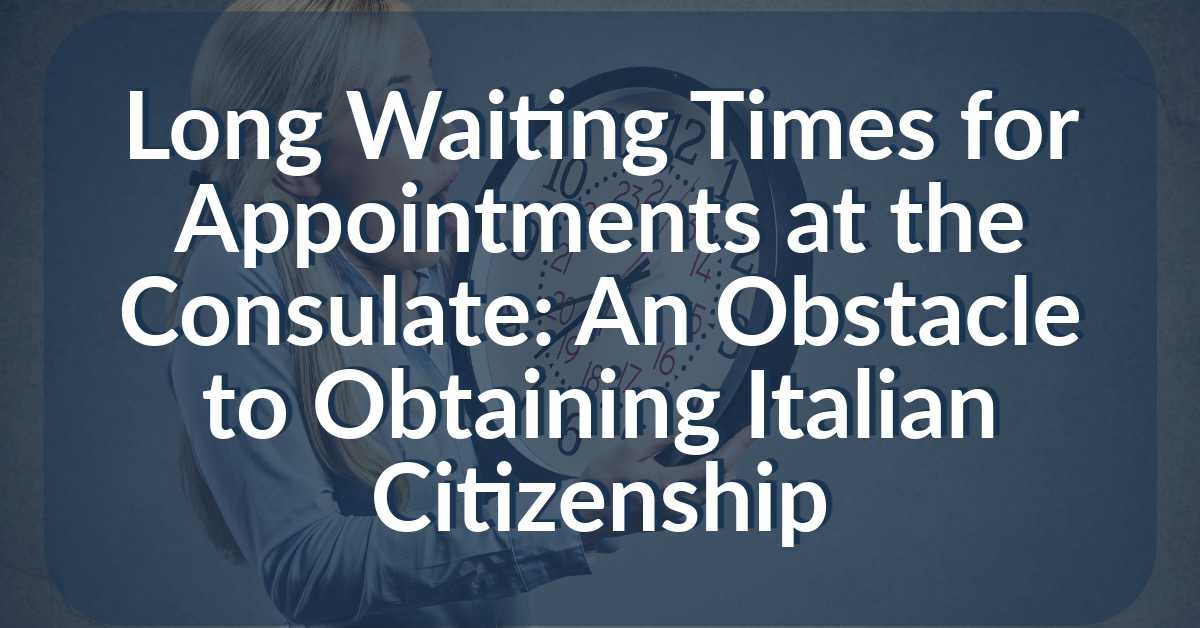Long Waiting Times for Appointments at the Consulate: An Obstacle to Obtaining Italian Citizenship
Are you a foreigner wanting to obtain Italian citizenship? Have you tried to make an appointment at the Italian Consulate in your country of residence, but the waiting times are extremely long? Or perhaps you can’t even book an appointment at all? Don’t panic! You’re in the right place!
In this brief guide, we will outline all the possible solutions to resolve your problem!
What is Italian Citizenship?
Citizenship is a legal status that a person assumes within a specific State, due to the bond that ties them to it.
This status guarantees a person a series of civil, political, and social advantages, allowing the citizen to exercise a range of rights that are not accessible to foreigners.
Who We Are
We are an Italian law firm focused on assisting international clients with legal matters governed by Italian law. We provide strategic legal guidance, clear communication, and professional representation in cross-border cases. Learn more about us.
By proceeding, you confirm that you have read and agree to our privacy policy.
From a civil point of view, Italian citizenship guarantees equality before the law, without distinctions of sex, race, language, religion, and political opinions. This principle of equality under Article 3 of the Italian Constitution is reflected in freedom of movement, association, religion, assembly, the protection of property, and, in general, all civil liberties that the State guarantees, removing obstacles that might limit their full enjoyment.
From a political perspective, Italian citizenship guarantees the power to influence the formation of national and local government through voting. There is also the possibility to run for administrative elections and to be representatives at the national and local levels. Moreover, one can participate in civic participation tools like referendums and popular petitions, which are provided to protect citizens’ rights.
The Great Benefits of Italian Citizenship
- Freedom of movement within the EU: Italian citizens have the privilege of moving, working, and residing in any EU member country without special permits.
- Long-term legal stability: Unlike residence permits that require periodic renewals, Italian citizenship is permanent.
- Access to the EU job market: This entails a wide range of job opportunities, the freedom to work in another EU member state without a work permit, and the guarantee of equal working and salary conditions as citizens of the country where one works.
- Right to health and social services: This includes access to the national health service, social security systems, and other benefits such as pensions and support in cases of unemployment or illness.
For more details, we suggest our following article: The Benefits of Italian Citizenship
How is Italian Citizenship Acquired?
The law states that, according to our country’s regulations, citizenship is obtained through the principle of jus sanguinis, that is, by birth from Italian parents or through adoption by Italian citizens.
However, there are some special situations:
- Citizenship obtained by being born in the State’s territory to parents without citizenship, or parents whose identity is unknown.
- Citizenship obtained through marriage to an Italian citizen, through a recognition process overseen by the prefect of the province of residence of the applicant.
- Citizenship obtained by naturalization, after having lived in Italy for at least ten years, demonstrating adequate economic support and the absence of criminal records or other security impediments.
How Does it Work for Those Residing Abroad?
For those living abroad, the request for citizenship, based on jus sanguinis, must be presented at the Italian Consulate in the country of residence. However, it is well known that in some countries, waiting lists are extremely long (in Brazil and Argentina, for example, it can take up to ten years). Often, it is even difficult to book an appointment, as available dates on the “prenot@mi” system are constantly sold out.
What is the “prenot@mi” System?
The Prenot@mi Portal aims to allow Italian or foreign citizens to book certain consular services for free. To use the site, preliminary registration is required, followed by the selection of the nearest Italian Consulate to book an appointment, based on available dates.
What to Do if Consular Waiting Times Are Too Long? What are the Possible Solutions for Obtaining Italian Citizenship?
The Rome Tribunal has established that if Consulates have excessively long response times, it constitutes a violation of the rights of the interested parties. It confirmed that such prolonged response times represent a denial of justice. Therefore, it is feasible to obtain the recognition of Italian citizenship directly from a Judge in Italy. This justifies the legitimate possibility of proceeding through judicial protection without waiting for responses from the Consulate.
What Does This Possibility Entail?
This involves a procedure regarding the State and individuals’ capacity, for which protection before the ordinary judge is always guaranteed under Article 113 of the Constitution (Supreme Court of Cassation, Joint Sections, judgment of 09/12/2008, no. 28873). This possibility is particularly interesting for those who wish to obtain Italian citizenship based on the right of blood and reside in South American countries like Brazil, Argentina, or the United States, where the volume of applications is particularly high and the processing times are extremely long.
Appealing to the Judge requires careful and detailed preparation of the arguments and documents to be relied upon.
What Documents are Needed to Appeal to the Judge?
To acquire Italian citizenship by descent, some documents are required:
- Extract of the birth certificate of the Italian ancestor who emigrated abroad, issued by the Italian municipality of birth.
- Marriage certificate of the Italian ancestor who moved abroad.
- Death certificate of the Italian predecessor. This document is particularly important if the ancestor married in Italy, as the death certificate is the only reference attesting to their presence in the foreign country.
- Certificate of non-naturalization of the ancestor.
- Birth certificates of all his descendants in a direct line, and of the petitioners in court.
- Marriage documents of his direct descendants.
- Authentic copies of any separation or divorce judgments or documents.
- If there are children born out of wedlock and only one parent registered the birth, and this parent does not transmit Italian citizenship, a public declaration is required in which the other parent, the Italian blood parent, attests and confirms being the biological parent of the child born out of wedlock.
Conclusions
After this brief guide, you will surely understand that it is a procedure that requires a lot of precision, but everything will be easier with the help of one of our Italian lawyers specializing in Italian citizenship!
Click here to find out the most frequently asked questions about Italian citizenship: FAQ on Italian Citizenship by Descent
Dott.ssa Laura Catanese
What we do
Explore our legal services for international clients under Italian law.
Start Here
Essential guides for international clients dealing with Italian law.








